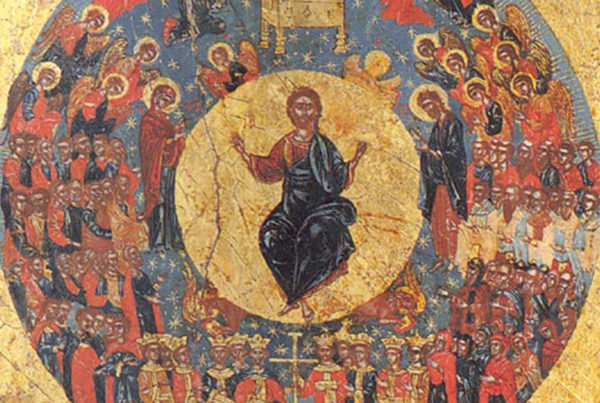I’m a church kid. Born and raised. 37 years, with some two dozen of those spent seriously following Jesus.
Some of my oldest and most spiritually formative memories are of my mother. The daughter of a farmer, my mom was, is, and probably always will be the earliest riser I know. And so, most mornings, I’d stumble out of bed and head downstairs to find my mom at her characteristic morning routine – sitting at the table, poring over the Scriptures, lifting her heart up to God in prayer.
Something about it resonated with me – in a totally intuitive, “this is right” kind of way. This is what Christians do in private devotion, I thought. They pore over the Scriptures, letting them transform them, awakening praise and prayer.
As such, as I grew and have grown in faith, that central habit has never left me. The Psalmist said, “Oh how I love thy law; I meditate on it day and night. Your commands have made me wiser than my enemies, for they are ever with me” (Ps 119:97). The Scriptures, I have found, provoke and awaken me, leading me to the adoration of and obedience to the One to whom they testify – Christ, the Lord. The centerpiece of my personal devotion is the encounter with the word that testifies to the Word, the word through whom the Word speaks – the Bible.
What is more, I have been pleased to discover that the great saints and mystics down through the ages have been similarly convicted and inclined. That is, this practice is not a late 20th century evangelical oddity. The church fathers and mothers, I have learned, saw the encounter with Scripture sacramentally. To pray and ponder the written text was to pray and ponder the Lord. No contemplative or mystical experience could be called genuinely Christian if it was not suffused with and guided by the Scriptures at every point. Whether we are talking about the Desert Fathers of the 3rd, 4th, and 5th centuries or the great bishops and theologians of the early church, whether we are talking about great thinkers like Thomas Aquinas or mystical teachers like the 14th century anonymous author of The Cloud of Unknowing, whether we are talking about nuns like Theresa of Avila or radicals like Madame Guyon, always and everywhere (I could go on and on with examples) – Scripture is the “domain” of the spiritual experience.
One of my favorite examples of this comes from the 20th century Catholic theologian Hans Urs Von Balthasar. In a towering meditation on the contemplative experience called, simply, Prayer (an annual read for me), Von Balthasar takes us to the heart of the matter, writing:
…our faculty of hearing loses its keenness and we no longer expect any fresh, challenging word from God. At this point, we are confronted with the living word of the Church. This is the word of proclamation, in sermon and teaching, but above all it is the word of holy scripture entrusted to the Church, a word from the Holy Spirit concerning the Son, a divine and authentic presentation and making-present of the revelation of the Father in the Son-Word, and hence also the spirit of the Word himself.
Von Balthasar here is imploring us have our hearing and so our lives disturbed by the word of Scripture which testifies to the Son. He continues, and these lines are crucial:
Just as it belongs to the Holy Spirit to cause the Son’s grace, his work and even his very corporality to become present, for every age, in the Church as a whole and in her individual sacraments, it is also his task to use scripture, as a form of corporality of the divine Word which befits the Incarnation, in order to set forth, before every age and each individual believer, the word-character of revelation. The Christian contemplates holy scripture, not insofar as it is man’s word, but as God’s word. He listens to the word in an attitude of worship…sharing the Church’s spirit of Marian obedience to the Word, led by the Holy Spirit…In contemplating scripture we learn how to listen properly, and this listening is the original wellspring of all Christian life and prayer. (Prayer, pp. 30-31)
The encounter with the ‘word’ of Scripture and the ‘Word’ made flesh, Von Balthasar says, are intimately bound up with one another. Scripture, he says, is a “form of [the] corporality of the divine Word which befits the Incarnation,” so that when we come to the text of Scripture in a posture of openness, humility, and above all, faith, we will be led by the Holy Spirit to the person of Christ who is the eternal Word of the Father, and the Spirit will likewise take that “imperishable seed” of the Word and implant it in our hearts, so that we bring forth the fruit of obedience, having been led to union with God.
This is how Christians, at their best, of all theological and denomination stripes pray. We enter into the word of Scripture, letting it unmake and remake us in the image of the Word which it communicates to us.
I write this in part because I saw on social media this week a little heat on a blog post published over at Desiring God entitled “Marry the Bible this Year.” The language, I suppose, is a bit shocking to many of us, but the spirit of it, in my opinion, is in exact concord with the profoundest intuitions of the Church down through the ages. What I do wish, personally, is that the author had spent more time articulating the close connection between the Bible and the Subject of which it speaks – the Living and Incarnate Word who comes to us through the written word… but all the same, the intuition is spot-on. So long as we come to the Bible aching to see and hear and submit to Christ the Lord, Christ will meet us and lead us and the Spirit will implant the Living Word in our hearts.
I frankly wish that more Christians would love the Bible in the way that the article commends. A church filled with folks like my mother – poring over Scripture, early in the morning, letting it awaken praise and prayer and loving obedience – would be a vibrant church indeed.
In the words of Mary the mother of God – “I am the Lord’s servant, may it be to me according to your word…” (Luke 1:38).
Indeed. May it be.




